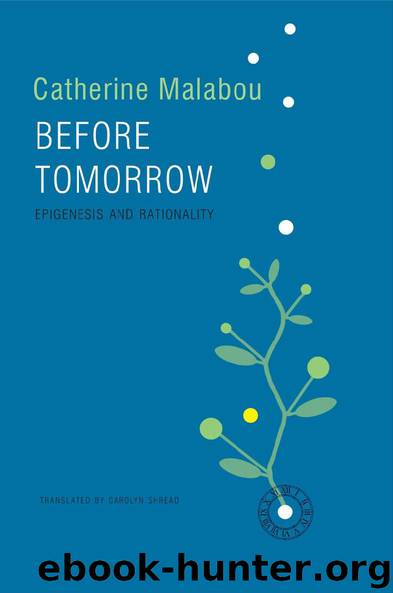Before Tomorrow- Epigenesis and Rationality by Catherine Malabou

Author:Catherine Malabou [Malabou, Catherine]
Language: eng
Format: epub
ISBN: 9780745691534
Publisher: Wiley
Published: 2016-09-05T22:00:00+00:00
This is to say that between the unknowable nature of the principle of original organization (the source of self-organization = X) and self-organization itself lies a gap from which proceeds epigenesis with its specific temporality: “Kant restores the role of time against preformationism” by defining epigenesis as an “improvisation [. . .] that generates order.” A temporal order that is “oriented, but not determined.”22 This view prefigures contemporary epigenetics!
In On the Use of Teleological Principles in Philosophy, Kant himself recognizes that he would willingly use the word “history” to describe such a becoming, if this word, “taken to mean the same as the Greek historia (narrative, description),” had not “been in use too much and too long for us easily to tolerate that it be granted another meaning which can designate the investigation of origin in nature.”23 Kant thus tries to avoid the risk of confusing “history” and “natural history.” In this admission, we nonetheless see that history is called upon negatively at this point of the analysis “in the wake of the vital force (Lebenskraft)” and epigenesis, to counter any preformationism, however minimal.24
By now widening the problem to the whole of transcendental philosophy, Lebrun argues that it is possible to introduce becoming into the a priori synthesis. And indeed, the three Critiques are structured by the same problem: the existence of a second source, which means that the source does not grasp itself at the source, but in what it produces, in what, starting from it, takes form and develops by differentiating itself. To explain §27 by holding on to the spontaneity of the understanding without taking its after-effects into account – the pure production of the subject through self-interpretation – amounts to amputating one of the essential dimensions from the motif of transcendental epigenesis, namely the appropriation of the origin as the subject’s self-formation.
In the second Critique, Kant demonstrates that the coincidence between the source of objectivity and subjective arising is the specificity of practical spontaneity. The Critique of Practical Reason also explicitly abandons all innatism and all preformationism when it brings to light the engendering point – epigenesis – for the objective reference of practical causality. A single a priori generative link is at work within thought and freedom. In the Transcendental Deduction of the Critique of Practical Reason, Kant returns to the discussion with Hume about “pre-established harmony.” He says that Hume would again deprive causality of all objective necessity, this time in the practical field:
If, with Hume, I had removed the objective reality from the concept of causality in its theoretical use not only with regard to things in themselves (the suprasensible) but also with regard to objects of the senses, then the concept would have lost all signification and, as a theoretically impossible concept, would have been declared entirely unusable; and since one also can make no use of nothing, the practical use of a theoretically null concept would have been entirely absurd.25
Download
This site does not store any files on its server. We only index and link to content provided by other sites. Please contact the content providers to delete copyright contents if any and email us, we'll remove relevant links or contents immediately.
The remains of the day by Kazuo Ishiguro(8961)
Tools of Titans by Timothy Ferriss(8359)
Giovanni's Room by James Baldwin(7313)
The Black Swan by Nassim Nicholas Taleb(7097)
Inner Engineering: A Yogi's Guide to Joy by Sadhguru(6782)
The Way of Zen by Alan W. Watts(6589)
Asking the Right Questions: A Guide to Critical Thinking by M. Neil Browne & Stuart M. Keeley(5751)
The Power of Now: A Guide to Spiritual Enlightenment by Eckhart Tolle(5741)
The Six Wives Of Henry VIII (WOMEN IN HISTORY) by Fraser Antonia(5493)
Astrophysics for People in a Hurry by Neil DeGrasse Tyson(5172)
Housekeeping by Marilynne Robinson(4432)
12 Rules for Life by Jordan B. Peterson(4298)
Double Down (Diary of a Wimpy Kid Book 11) by Jeff Kinney(4257)
The Ethical Slut by Janet W. Hardy(4235)
Skin in the Game by Nassim Nicholas Taleb(4231)
Ikigai by Héctor García & Francesc Miralles(4228)
The Art of Happiness by The Dalai Lama(4118)
Skin in the Game: Hidden Asymmetries in Daily Life by Nassim Nicholas Taleb(3986)
Walking by Henry David Thoreau(3948)
